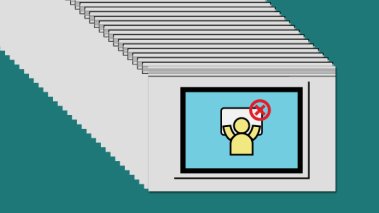Table of Contents
Report: As online censorship surges, FIRE fights back

- Colleges have censored online speech for years — and with more virtual classes, the problem is bound to worsen.
- FIRE’s report examines censored students and faculty members, colleges that maintain the worst policies on internet censorship, how colleges censor on social media, and the cost of censorship abroad.
- FIRE: “All it takes is an opinion and a Twitter account, and you could be next.”
PHILADELPHIA, Oct. 20, 2020 — While the difficulties brought by online teaching due to COVID-19 are new, universities’ struggles with respecting student rights online are not.
Memory-holed: Universities and Internet Speech, a new report from the Foundation for Individual Rights in Education, explores the surge in online censorship and examines some of FIRE’s biggest online speech cases from the past two decades, including:
- a professor who was sanctioned for a social media post about Game of Thrones;
- an administrator who punished a student for posting to Instagram a topless photo of herself on a European beach, where nudity is legal;
- a student who reached a $900,000 settlement with his college after the university president unilaterally expelled him for his criticism of two parking garages;
- a student who emailed his classmates that he was withdrawing from a class, encouraging them to join him in taking it in the spring — and was found guilty of hazing, disorderly conduct, and breach of the peace;
- a professor placed on forced administrative leave for emailing George Washington’s Thanksgiving address;
- and unsurprisingly, plenty of controversial tweets.
“From Myspace to Instagram, administrators have used every social media platform to discourage, censor, and punish free expression,” said Sarah McLaughlin, Director of Targeted Advocacy and author of the report. “The platforms may change, but the threat to free speech doesn’t. In 2020 and beyond, with more of the college experience occurring online, the problem is only going to get worse.”
The report examines the 35 institutions across the country that hold the worst, “red light” rating in FIRE’s Spotlight Database for their policies regulating social media or other online content. This speech code rating denotes policies that both clearly and substantially restrict freedom of speech — and should be a warning sign to students.
The report also examines how colleges restrict speech on their social media pages, collectively blocking 1,825 unique words and phrases including the names of political figures, corporate partners, sports teams, faculty members, and even an emoji.
The problem extends beyond America’s borders: The report shows how international students, and American students studying abroad or through international partnerships, face serious consequences for internet speech — including arrest.
“Students and professors are constantly facing investigations and punishments for speech that’s fully protected by the Constitution,” said McLaughlin. “All it takes is an opinion and a Twitter account, and you could be next. And when that happens, FIRE is here to fight for you.”
The Foundation for Individual Rights in Education (FIRE) is a nonpartisan, nonprofit organization dedicated to defending and sustaining the individual rights of students and faculty members at America’s colleges and universities. These rights include freedom of speech, freedom of association, due process, legal equality, religious liberty, and sanctity of conscience — the essential qualities of liberty.
CONTACT:
Daniel Burnett, Director of Communications, FIRE: 215-717-3473; media@thefire.org
Recent Articles
FIRE’s award-winning Newsdesk covers the free speech news you need to stay informed.

BREAKING: New Title IX regulations undermine campus free speech and due process rights


Stanford president and provost cheer free expression in open letter to incoming class
